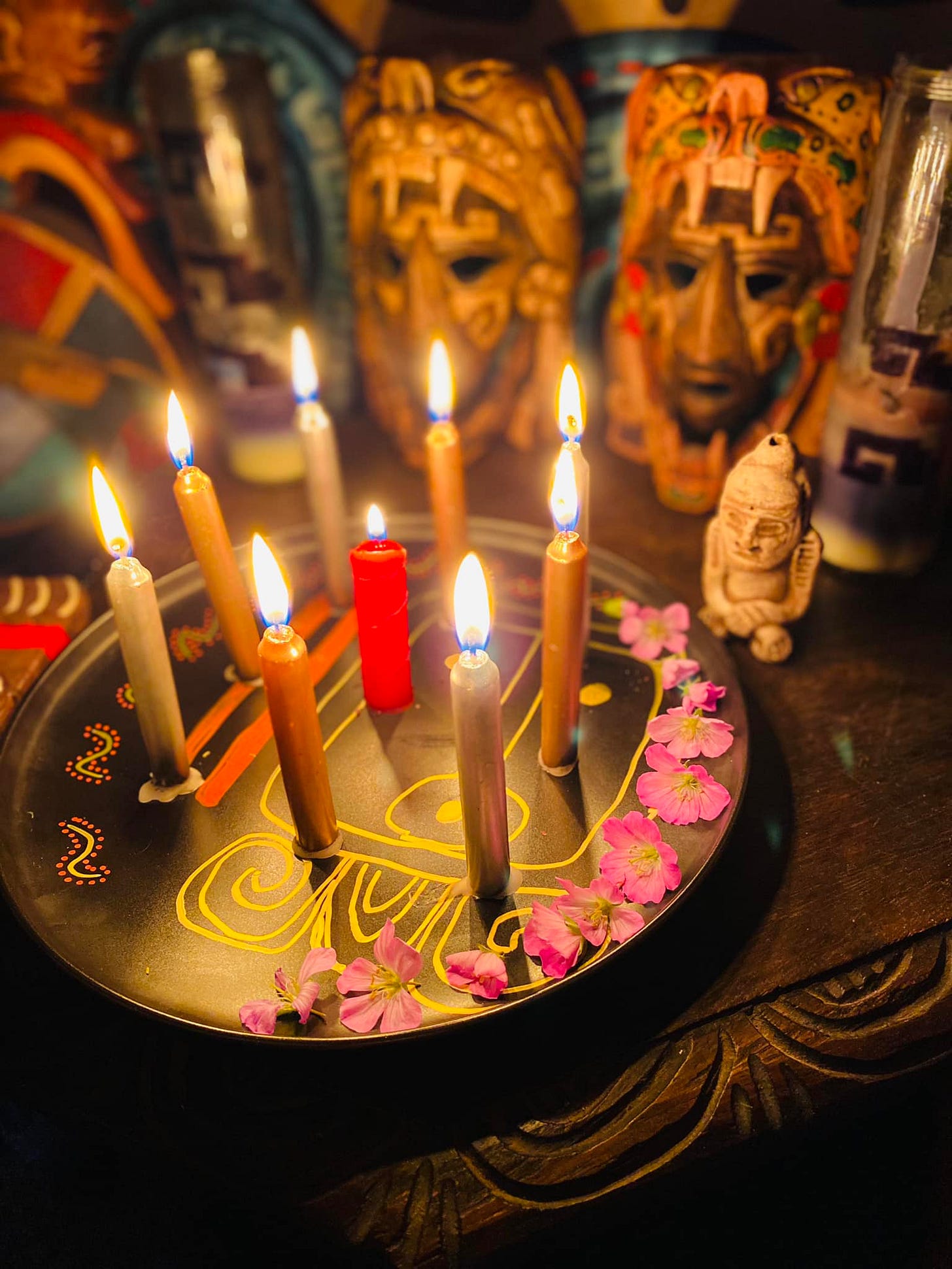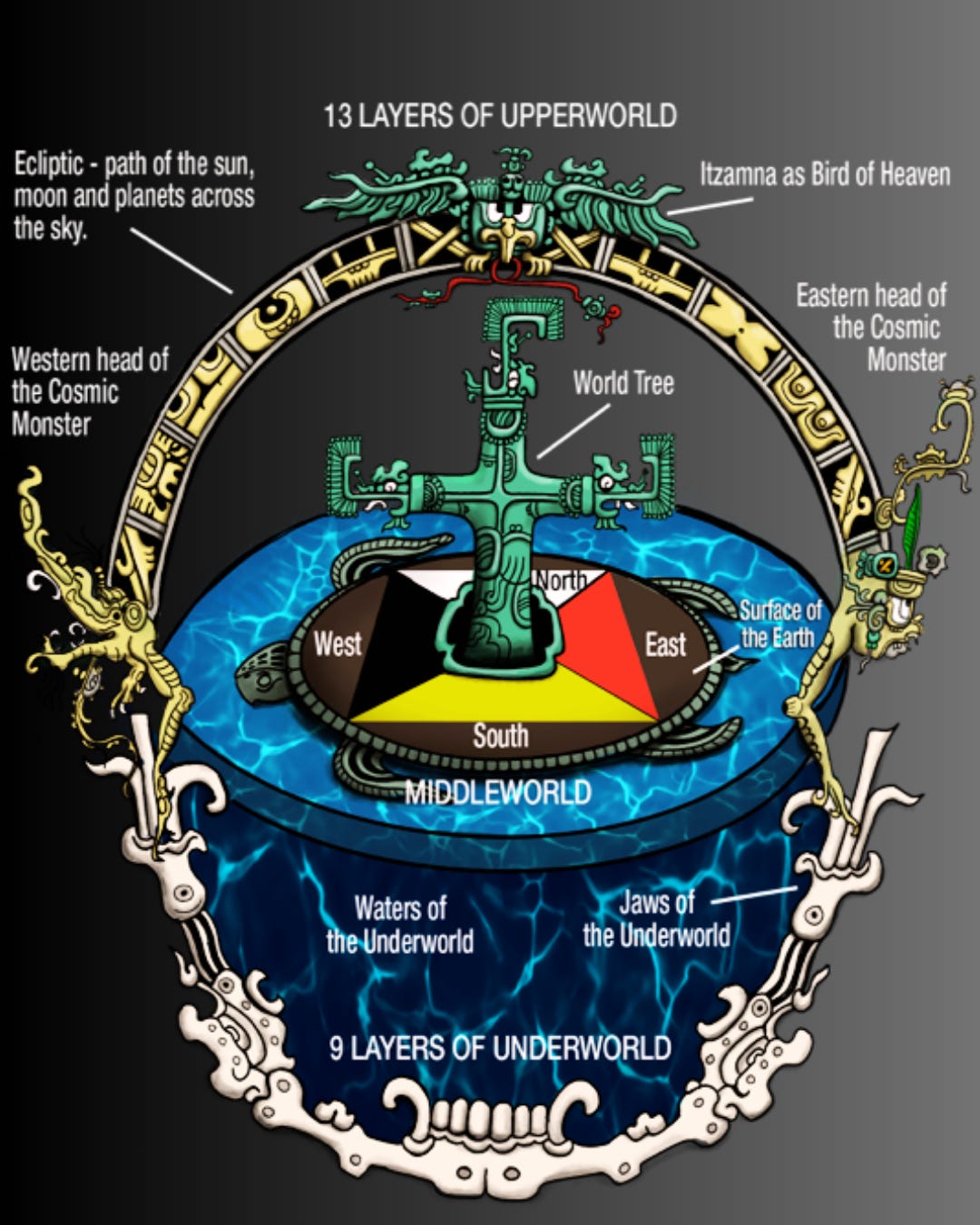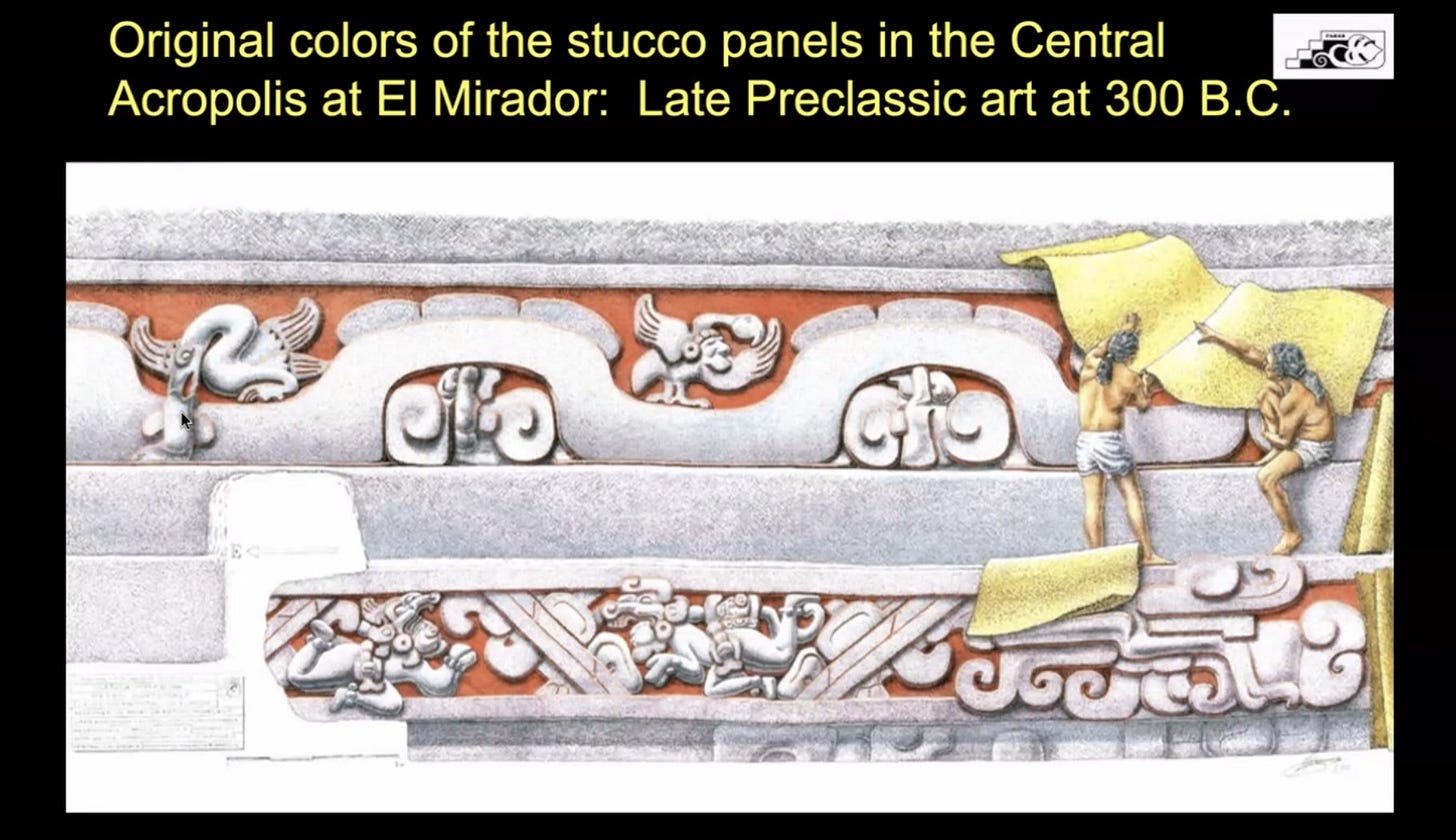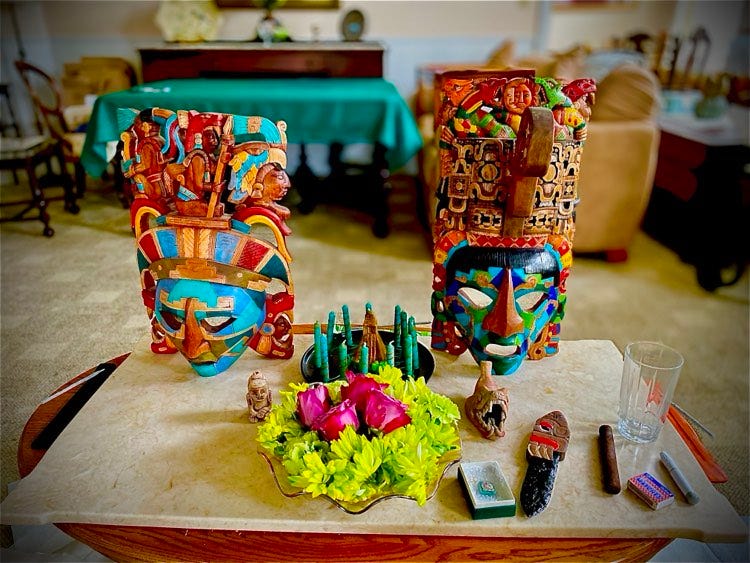Unlocking the Occult: 5 Advanced Foundational Tips Every Occult Beginner Needs
Move beyond Beta-theories into practical Alpha-application with these Sigma-suggestions to bridge the gap between novice and adept
You have assessed your beliefs, committed to daily practice, and chosen a general path with curiosity and research. Now what? The transition from occult introductions to practical application leaves many beginners stranded in a frustrating limbo, unsure how to go about using their accumulated knowledge for tangible magical results. This critical juncture, where book learning meets real-world practice, determines whether you will develop into a capable practitioner or remain perpetually stuck in the beginner's cycle of consuming information without meaningful progress. These five essential skills form the practical toolkit that transforms theoretical knowledge into living magic, providing the concrete techniques and frameworks necessary to build a functional, effective practice that produces real results rather than wishful thinking.
Tip 1: Have a Go-To Divination System
Choose your divination system with cultural intelligence and practical wisdom. Divination serves as one of the three pillars of occultism—divination, thaumaturgy and theurgy. It is your direct line of communication with the unseen forces you are learning to work with. However, selecting your primary divination system requires more nuance than simply picking whatever cards have the prettiest artwork or following the latest social media trend. Your choice must balance cultural authenticity, practical accessibility, and genuine resonance with your chosen magical path.

Every established magical tradition has developed specific divination methods that align with its worldview and spiritual mechanics. In Santería and other African diasporic traditions, for instance, the Orishas communicate through specific oracle systems like the Dilogún (cowrie shell divination) or the Opele chain used in Ifá, not through tarot cards or runes. These systems are not arbitrary choices—they are integral to the tradition's cosmology and carry specific protocols, taboos, and interpretive frameworks that have evolved over centuries. Attempting to substitute a culturally disconnected divination method is not just disrespectful; it's ineffective, like trying to tune into a specific radio frequency with the wrong type of receiver.
For beginners not working within a specific cultural tradition, I strongly recommend starting with oracle cards or pendulum work. These tools offer several advantages for developing foundational divination skills. Oracle cards, unlike tarot with its complex system of major and minor arcana, allow for more intuitive interpretation. They train your psychic sensitivity without overwhelming you with elaborate correspondence systems. Each deck typically focuses on a specific theme or energy, making it easier to develop clear communication channels with your subconscious or spiritual guides. At times, tarot is treated more like a buzzword rather than an attempt to illustrate the tarot divination system. This has led deck makers to forcibly make decks that do not synergize with the 78 card system when they would have been better off making an oracle to exercise their creativity. People automatically think tarot is better and prematurely dismiss other options when at the beginning stages an oracle would have served their development much better. There are also advanced oracle decks that construct a system around its artwork.
Pendulum work offers even more immediate feedback and helps develop your sensitivity to subtle energies. Start with simple yes/no questions where you can verify the answers, gradually building trust in your ability to receive accurate information. The pendulum also teaches you to recognize how your own energy and expectations can influence divination—a crucial lesson in self-awareness for all magical work.
As you develop proficiency, pay attention to which system feels most natural. Some practitioners find their intuition flows through visual symbols, making cards ideal. Others connect better with tactile systems like runes or bones. Some discover their gift lies in scrying or automatic writing. The key is starting with accessible tools while remaining aware of and respectful toward the cultural contexts of more advanced systems you might eventually study.
Remember that divination is not just about predicting the future—it is about developing a dialogue with the unseen aspects of reality. Your chosen system becomes a language through which you communicate with your higher self, spiritual guides, the collective unconscious or a myriad of different models. Approach it with the same dedication you would bring to learning any new language: daily practice, patience with mistakes, and gradual expansion of your vocabulary and fluency. Oh, and try to have some fun.
Tip 2: Get Reps In the Magic Gym
Become proficient in the three main modes of essential spellcraft. Before you even consider working with spirits, entities, or complex ceremonies, you must develop competency in the three fundamental operations of practical spellcraft: cleansing, protection /repelling and attraction. These form the basis of virtually all force-of-will related magic and attempting advanced practices without committed repetitions of them is like trying to perform surgery without understanding anatomy.
Cleansing is the magical equivalent of brushing, flossing and clipping your nails—absolutely essential yet often overlooked by beginners eager to jump into more dramatic work. Every person, object, and space accumulates energetic residue from thoughts, emotions, and interactions. This psychic debris interferes with magical work the same way physical dirt interferes with delicate machinery. Develop a repertoire of cleansing techniques: smoke cleansing with appropriate herbs (not just sage—research what is ACTUALLY traditional for your practice), salt water preparations, sound cleansing with bells or singing bowls, and visualization techniques for energetic purification. Learn to recognize when cleansing is needed: heavy feelings in a room, the sense that a tool is not responding properly or persistent bad luck often indicate accumulated negative energy. I encourage developing at least three different kinds of cleansing methods simply because Palo Santo cannot dispel everything. Note that cleansings are not necessarily the same thing as expelling malicious spirits—that is a whole other game often requiring a level up and specific procedure.
Protection and repelling work creates energetic boundaries and deflects harmful influences. This is not paranoid fantasy about psychic attacks (though those do exist)—it is practical energy management. Just as you lock your doors at night, magical protection prevents unwanted energetic intrusions. Start with personal shielding exercises, visualizing protective barriers of light, mirrors, or elemental forces surrounding your aura so-to-speak. Progress to creating protective talismans, setting up wards around your home, and learning to break energetic connections with people or situations that drain you. This work teaches you to consciously direct energy and maintain boundaries—skills essential for all advanced magic. Protection and repelling might sound similar to cleansing but tends to be much more assertive. A note worth repeating is that simple repulsions are not going to remove terrible spirits from your life. Again, if you have called something very bad or have gotten mixed up into the crossfire of something nasty, you will need procedures that are much heavier duty.
Attraction magic draws desired energies, opportunities, or resources toward you. This encompasses traditional love, money and any kind of favorable spells but extends far beyond them. Learning to attract specific energies teaches you about magical timing, the importance of clear intention, and how to create energetic resonance with your desires. Ideas for these kinds of spells are plentiful on the internet and in books. Candle magic, directing energy, sigils, charm bags and talismans are all great templates for beginners. I recommend getting quality repetitions with these types of models before progressing to the famed formulas of spirit invocation and evocation.
This approach offers several advantages. First, it develops your ability to raise, direct, and ground energy—the fundamental skill underlying all magic. Second, it reduces the risk of unintended consequences from poorly managed spirit relationships. Third, it ensures you can perform effective magic even when you do not have access to elaborate tools or the ability to perform complex rituals.
Tip 3: Develop Deep Fluency in the Language of Correspondences
Correspondences—the network of symbolic relationships linking colors, herbs, planets, elements, numbers, and countless other factors—form the grammar of magical practice. While beginners often approach correspondences as rigid rules to memorize, truly understanding them means recognizing them as equational tetris pieces that vary across traditions and evolve through practice.
At its core, the system of correspondences reflects the multicultural principles reminiscent of "as above, so below"—the idea that patterns repeat across different scales of existence. The fiery nature of Mars manifests in the color red, the herb nettle, the metal iron and the emotional quality of anger or courage in many western systems. By working with these corresponding elements, you create sympathetic resonance with the planetary force itself. However, these associations are not universal constants—they are culturally constructed frameworks that vary significantly across traditions.
Start by deeply studying one comprehensive system rather than mixing and matching from various sources. If you are drawn to Western ceremonial magic, immerse yourself in the Golden Dawn correspondences. If you practice traditional witchcraft, Troy Books has a selection of literature for you. If you follow an African diasporic tradition, start frequenting botanicas and talking to people. This focused approach prevents the confusion that comes from trying to reconcile contradictory systems and allows you to understand the internal logic of your chosen framework.
As you study, look for patterns and relationships rather than memorizing isolated facts. Why is Venus associated with green in some systems and pink+white in others? How do the planetary hours relate to the days of the week? What is the relationship between the elements and the directions in your tradition? Understanding these connections transforms correspondences from arbitrary assignments into a coherent worldview.
Practical application deepens theoretical knowledge. When you burn a green candle for money magic, pay attention to how the color affects your consciousness. Notice how working with different herbs changes the energy of your spells. Observe how planetary days and hours influence your magical results. Keep an observant record of what works and what does not, gradually developing your personal understanding of how correspondences function.
Respect for different cultural viewpoints is crucial when working with correspondences. The Western association of the number 13 with misfortune and negativity does not hold in Mesoamerican traditions where 13 represents the resplendent Upperworlds. Avoid appropriating correspondence systems from traditions you are not initiated into or do not fully understand. The specific way Santeria, Lucumi and other west African diasporic practitioners work with colors in relation to the Orishas, for instance, carries cultural and spiritual significance that cannot be extracted and used casually.
Eventually, you can develop UPG (unverified personal gnosis) correspondences based on your own experiences and cultural background. Perhaps a specific song consistently helps you enter trance or certain symbols carry a new weight. These personal associations, developed through practice and observation, become powerful additions to traditional correspondence systems. For example, a powerful symbol I have been meditating on is the Pale Blue Dot photograph from the Voyager spacecraft and the landmark work of Carl Sagan. While modern, the Pale Blue Dot conveys cosmological significance in a literal fashion possibly greater than any ancient symbol. Perhaps I will write a future article on that existential crisis inducer of a photo.
Tip 4: Read books about magic that are NOT magic books
Immerse yourself in the historical context of magic. While popular occult books offer spells and techniques, historical texts provide something far more valuable: context that transforms magic from a collection of random practices into a coherent worldview. Reading history—not just occult history, but general historical works—reveals magic as an integral thread woven throughout human civilization, not a fringe practice separate from "real" life.
*courtesy of Dr. Richard Hansen’s February 2025 Institute of Maya Studies Presentation on the El Mirador Basin
Historical study illuminates how magical practices evolved in response to specific cultural needs and circumstances. The grimoire tradition of medieval and Renaissance Europe, for instance, makes little sense without understanding the period's synthesis of Christian theology, Islamic scholarship, Jewish mysticism, and classical philosophy. The elaborate ceremonies for summoning demons were not products of evil intent but reflected a worldview where spiritual beings formed a vast bureaucracy that could be negotiated with through proper protocols.
Pick any historical period that interests you and dive deep. Read primary sources when possible, not just modern interpretations. The Greek Magical Papyri reveals the syncretic magic of Hellenistic Egypt. The Picatrix shows how Arabic astrological magic influenced European practice. The folklore collections of the 19th century preserve folk magic traditions that might otherwise have vanished. Even reading the court records of witch trials, approached critically, provides insight into actual folk practices beneath the prosecutors' distortions. This will help you distinguish what is actually an ancient viewpoint versus something that is simply old. Unraveling history is a gnostic shock of an experience. You will be surprised at how many of the things you believe are influenced by things you did not see coming or did not want to see coming.
Beyond specifically magical texts, general histories enrich your understanding enormously. Social histories reveal how ordinary people used magic to navigate daily challenges. Economic histories show how trade routes spread magical ideas across cultures. Religious histories demonstrate the constant interplay between orthodox religion and magical practice. Scientific histories reveal that many renowned scientists were also alchemists and astrologers, seeing no contradiction between empirical observation and magical philosophy.
This historical grounding offers practical benefits for modern practice. First, it provides tested techniques that have survived because they work. A spell that appears in multiple grimoires across centuries likely has genuine efficacy. Second, it helps you avoid modern misconceptions. The idea that witches were always burned at the stake, that magic and Christianity are inherently opposed, or that ancient traditions remained unchanged for millennia all crumble under historical scrutiny.
Historical context also teaches discernment. You learn to recognize when modern authors are inventing "ancient" traditions, when they are misinterpreting historical sources, and when they are projecting contemporary values onto past practitioners. This critical thinking skill protects you from the misinformation rampant in modern occultism.
Most importantly, historical study reveals that magic has always adapted to its circumstances. Medieval magicians incorporated new scientific discoveries into their practice. Renaissance occultists synthesized traditions from newly translated texts. Folk practitioners adapted their magic to industrial and urban environments. This historical perspective frees you from rigid traditionalism while maintaining respect for the past, showing that innovation and adaptation are themselves traditional. One does not need to look far to question the departure from the far-left leaning historical and biblically described Christ and wonder how has this figure become adapted into MAGA rituals involving bacon, firearms and Sunday afternoon football.
Tip 5: Find Your Magical Community
* ORG-001 “Thunderbolt Ultima” courtesy of the Ohio Ritual Group
Navigate the complexities of finding your magical training partners. The romantic image of the solitary witch or magician, working alone in perfect independence, appeals to many beginners. While solitary practice has genuine value and may be necessary during certain phases of development, prolonged isolation limits your growth in ways you might not realize until you experience the alternative. Finding and engaging with a magical community—whether online or in-person—accelerates your development, provides crucial reality checks, and offers experiences impossible to achieve alone.
The benefits of community engagement extend far beyond simple social connection. Cross-training with practitioners from different traditions exposes you to techniques and perspectives that enrich your own practice. That chaos magician might teach you about paradigm shifting, while the traditional witch shares herb knowledge passed down through generations. The ceremonial magician demonstrates the power of precise ritual structure, while the energy worker helps you feel what you have only visualized. This comparative analysis strengthens your understanding of universal principles while highlighting what makes your chosen path unique.
Group ritual work offers existential experiences that solo practice simply cannot replicate. The combined energy and efforts of multiple practitioners creates a field stronger than the sum of its parts. You learn to harmonize your energy with others, to hold your role in complex workings and to experience magical states that require collective consciousness. Even if you primarily practice alone, occasional group work teaches invaluable lessons about energy dynamics and magical cooperation.
However, finding the right community requires discernment and sometimes courage. Past negative experiences—judgment from other practitioners, encounters with toxic group dynamics or betrayal of trust—might make you hesitant to engage. These concerns are valid, but do not let them permanently isolate you. Start slowly with online communities where you can maintain anonymity while feeling out the group dynamic. Look for red obvious flags: groups that demand immediate commitment, claim to be the only "true" tradition, require excessive financial investment or discourage questions and critical thinking.
Healthy magical communities share certain characteristics. They respect diverse paths and practices while maintaining their own traditions. They encourage questions and acknowledge when they do not have answers. They maintain appropriate boundaries between teacher and student roles. They focus on practice and development rather than drama and politics. They celebrate members' growth and achievements without competitiveness.
Building trust takes time. Start by participating in public events (open rituals or workshops) before committing to closed workings. Online, contribute thoughtfully to discussions and observe how established members interact before sharing personal information or experiences. When you find practitioners you resonate with, cultivate those relationships gradually. Not everyone needs to know everything about your practice immediately.
Create your own community if you cannot find one that fits. Start a study group focused on a particular text or technique. Organize informal gatherings for the sabbats, moon phases or practice-specific holidays. Host skill-shares where practitioners exchange knowledge. Even connecting with just one or two compatible practitioners provides many benefits of community while avoiding large group dynamics.
Remember that magical community does not require complete agreement or perfect harmony. Some of your most valuable learning will come from practitioners whose approaches differ radically from yours. The key is maintaining respect, healthy boundaries and focusing on mutual growth rather than proving who is "right" about magical theory or practice. Speaking candidly, being a part of several groups over the years has leveled up my game significantly. Groups of various skill levels can be beneficial but it is truly something special when you find a group striving for professionalism.
Integration: Weaving These Skills Into Living Practice
These five skills—divination proficiency, fundamental spellcraft, correspondence literacy, historical context and community engagement—work synergistically to transform you from someone who knows about magic to someone who does magic effectively. Divination guides your spellcraft by revealing hidden factors and optimal timing. Correspondence knowledge enriches both divination and spellwork with deeper symbolic layers. Historical context grounds all your practices in tested tradition while encouraging informed innovation. Community provides feedback, support, and experiences that accelerate development in all areas.
Implement these skills gradually rather than trying to master everything simultaneously. Perhaps spend one month focusing intensively on divination, doing daily readings and recording results. The next month, maintain your divination practice while adding daily energy work to develop your spellcraft. Continue this progressive integration, allowing each skill to support and enhance the others.
Most importantly, approach these practices with patience and realistic expectations. Magical development follows a spiral pattern not a linear one. You will revisit these fundamentals throughout your practice, each time understanding them more deeply. What seems like basic cleansing work now will reveal sophisticated applications years later. The divination system you start with might become your lifelong practice or serve as a stepping stone to something more aligned with your developing path.
The journey from beginner to competent practitioner is not measured in months but years. However, by focusing on these practical skills rather than accumulating theoretical knowledge or chasing advanced techniques before you are ready, you ensure that your progress, while gradual, is genuine and sustainable. Honor your path with consistent practice, respectful study, and open engagement with the wider magical community, and you will find yourself developing capabilities that once seemed impossible.
What practical skills have proven most valuable in your own magical development? Which of these areas challenges you most, and what strategies have you found for working through those challenges? Share your experiences below. Your insights might provide exactly the guidance another practitioner needs to break through their own barriers.
Here is a magical book club I recommend ran by the infamous Ivy Corvus on her Youtube Membership: https://www.youtube.com/@IvyTheOccultist/featured
For more functional magic check out my Courses: https://mayanmysteryschool.com/collections/all







A good read. I resonate with the oracle deck idea. I’m slowly learning tarot but sheesh, there’s a lot to learn.